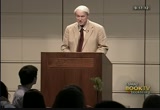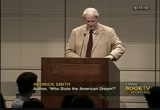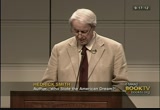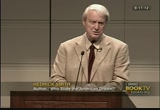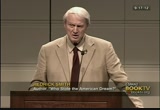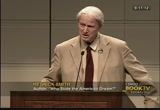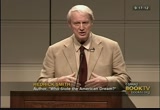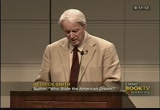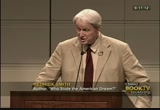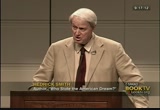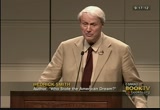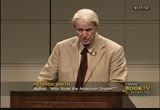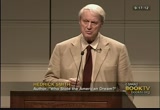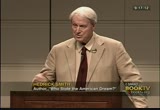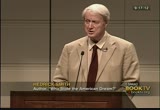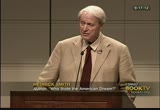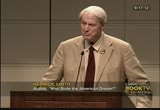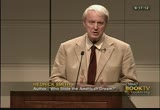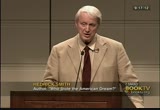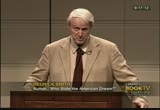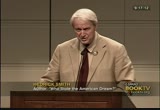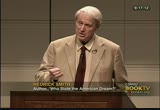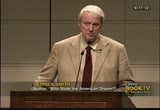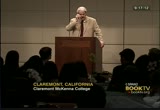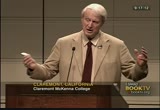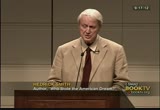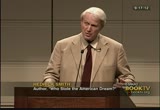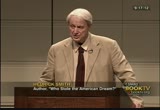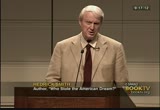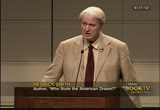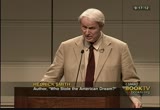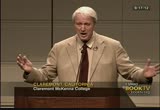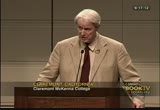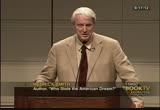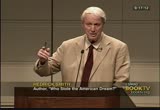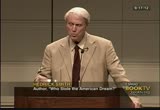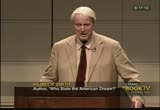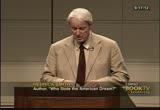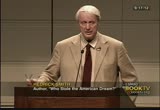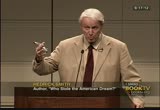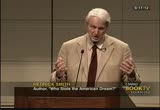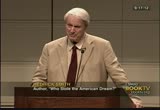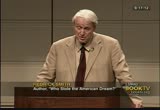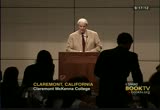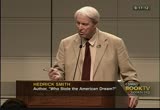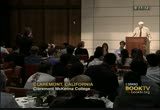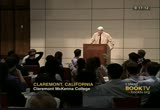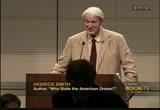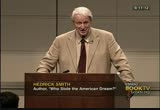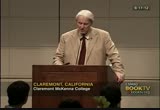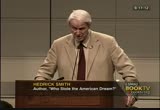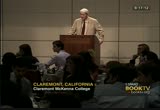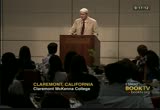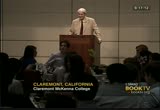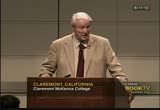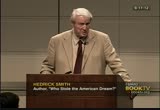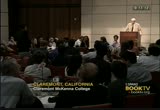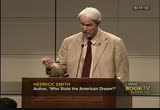tv Book TV CSPAN October 14, 2012 7:00pm-8:00pm EDT
7:00 pm
attention. [applause] >> every sunday at 6 p.m. eastern booktv airs a program from our archives that coincides with a significant occasion that happened that week in history. for more history programming, check out american history television, ah-tv features 48 hours of people and events that help document the american story. watch american history tv on c-span3 or visit c-span.org/history. ..
7:01 pm
7:02 pm
>> thank you, dave. that was great. let me thank bonnie and my friend, professor fred lynch for inviting me and president pamela at the university for being present at the lecture this evening and thank you all for coming this evening. it's my honor to be here. i feel the especially connected to southern california because i have family in your area. grandchildren and a stepdaughter and a son-in-law that is here. so i want to affirm my connection with the l.a. region. thinking about the predicament we are in in this country today reminds me that charlie brown cartoon the one where lucey goes in the backyard and sets up a table that says psychiatry 1 cent. charlie comes up and says, he puts his penny down and she says
7:03 pm
charlie, in order for me to help analyze you and your problems, of life as a voyage on a great ocean liner. are you one of those people who takes your chair of the bowel and looks into the future to see where you're going or are you one of those people that takes your chair to the store man looks back to see where you come from and he thought a moment and said i'm having trouble getting my chair unfolded. [laughter] so here we are. i will share with you a couple of quotes from my book this one is louis brandeis. we must make our choice. we have democracy or we may have wealth concentrated in the hands of a few, but we can't have both. and then a comment from john w. gardiner who was not only a cabinet secretary to lyndon johnson but was the longtime
7:04 pm
head of the public advocacy group public cause. we are treading the edge of a process. civilization by is of disenchantment. if enough people doubt their society, the whole venture falls apart. we must never let bangerter or political partisanship boehler our vision on that point. we must not to despair the republic. we will tell some tough stories tonight but we must not despair the republic. here we are in the midst of the election and we have to choose a president and congress. an awful lot of people don't trust a party or the political system to work right and we don't really understand how we got to where we are. the truth is we have more questions than answers. i myself did as i started out the work in researching this book. how do we become too americas? how do we stop being an american with shared prosperity and
7:05 pm
values and shared sense of democracy? how we lose the title of land of opportunity because if you study reasoned sociology you will find people can rise more rapidly, more easily in other countries than in america? that didn't used to be the case. how do we move from an era of great by partisan politics of middle class power and prosperity and now live in bitter partisan gridlock and equal democracy to learn a quality in our economy and the middle class stock in a rut. with that predicament of hours as the outcome of irresistible market forces that advance of technology and globalization and how the country like germany and others like how does a country protect its middle class and do much better on the global market than we have done? what's happened to the political middle in america why can't we
7:06 pm
find the bridge any more? where has it gone? why are we stuck in these extremes? well, let me confess to you right off the bat the american dream is not a book i set out to right. i signed a contract with random house to write a book called the treen at risk. like a lot of people understood i understood the american middle class was in deep trouble and i was interested in trying to find out what had happened, how we got here and at the same questions i just asked a moment ago. what happened is the book involved. i kept learning and it's embarrassing to say i kept learning about a per call with history in america that i covered myself in the 1970's i was in "new york times" washington bureau chief and i covered some of the reasons that i'm going to write about and talk about in this book and in the lecture this evening. i hate to admit it but i've learned in all of lot during
7:07 pm
this book and there's a lot of stories i missed and a lot of other journalists missed what was going on under our noses so it wasn't that we missed the details but we missed the big picture, we missed a trend and the watershed. this book tries to put those things together. and for me as a reader as well as a reporter looks that put things together are absolutely critical. once the time the book comes out this temptation to say what are the secrets and the power struggles and the gossip that we didn't know before but if you think of a book like team of rivals about abraham lincoln and the people that served in his cabinet it provided an incredible new free market in sight for understanding abraham lincoln because she took the time to tell the story after it evolved as lincoln and his rivals grew up in the 1830's come 1840's come 1850's and 1860's by the time they got to the civil war, and you
7:08 pm
understood them the bears to think big and tackle the big questions because we are not going to get to a smart fix in this country about this country's problems unless we understand the root causes of what royals the nation today and i don't believe that we are getting very much of that from the current presidential campaign from aside. politicians and lots of ways like to tiptoe around the big issues in the campaign because suffered real, that hot as of
7:09 pm
reporter it was full of surprises and there was a massive transfer of wealth in the middle class to the rich over a period of time and i discovered that the main victims of the sub prime housing crisis for people who deserved prime loans and they were tricked into taking out loans that were to their disadvantage. i discovered the following system that we now depend on so heavily had an accidental beginning and was never intended to do what it has been called upon to do today. but one of the biggest surprises i had was to discover their role of lewis powell and our political history. i wonder how many people in this room -- could you raise your hand of the word lewis powell means something to you? in the back of the room we are getting it. let me share this with of the students and also say how happy i am to be speaking to a student audience. the book i've written is for you
7:10 pm
and your generation. it is the decayed to you and your generation to my kids and your kids because what is in this book and what has happened to america is going to have a bigger impact on your lives unless we change it than it is going to have on the lives of my generation. lewis powell was a man knew to the supreme court by richard nixon at the republican president. he served with distinction on the court for 17 or 18 years. he'd been a corporate attorney out of richmond virginia, a member of the virginia aristocracy with a water trough and very modest manner. he'd been present in the american bar association. two months before richard nixon named lewis powell to the supreme court, lewis powell wrote in memorandum about the state of the american economy and particularly the state of the free enterprise system in america. powell was an unusual paul revere but issued a call to arms in american business and said
7:11 pm
the free enterprise system was under assault from trade unions from consumer advocates like ralph nader who wrote the book. there was assault from environmentalists who advocated the establishment of environmental controls that would restrict industry. there was assault in academia from liberal academics and liberal economists, and he said was time for business to organize itself, is to start playing hardball in politics to become aggressive, to identify it and the means to go after its enemies and punish them and take over the power in washington. and to do it by organizing and by using the financial resources that the business and by taking to the battlefield in the lobbies and in the corridors of power in washington. what is astonishing is that that happened and i have to say running in "the new york times" bureau chief -- running "new york times" as its bureau chief in 1978 several years after the powell memorandum, i had never
7:12 pm
heard of it. i never heard of it until two or three years ago going back into reading some history and i can tell you most of the correspondence haven't either. i talked to them a week ago and was news to them even now. but the main thing is what happened. business took powell's warning and call to arms very seriously. the business roundtable that is formed by 150 of the largest corporations in america the big multinationals was formed within a few months after his memorandum in response to that memorandum. the association of manufacturers decided it better move its headquarters to washington. the federation of independent businesses which is the arm of small businesses across america grew to these numbers from 3,000 members in 1971 to 600,000 members by 1981. the u.s. chamber of commerce itself which circulated a memo to business leaders all over the
7:13 pm
country doubled its staff and tripled its budget. the number of companies that had lobbying offices in washington grew from 175 in 1971 to over 2,220 just eight or nine years later. there were by 1980 and by the late 1970's were 9,000 lobbyists in washington and another 8,000 people working for corporations in washington and there were 50,000 people working for the trade associations for business trade associations so the number of business lobbyists outnumbered the members of congress 130-1. now, what most of us have bought for a long time and the way it's been discussed in history is the changes that occurred in the american political system with the election of ronald reagan in 1980. i'm here to tell you that my research tells me that the pivotal congress in the last 40
7:14 pm
or 50 years in american history was the congress of 1978. it was a democratically controlled congress. they had majority in both the house and senate and jimmy carter was the president at that time so this is an unlikely situation. what was interesting -- think about unlikely situations -- lewis powell, when he was thinking about the bigotry agencies, the epa, osha, the boards were about the components of richard nixon. the very president who named him to the court not so much the policies of the democrat who preceded nixon in the white house lyndon johnson so the pro republican business leaders in effect against the policies of the republican president and you have the biggest changes taking place in the democratic congress with a democratic president in charge. where's the evidence? when the carter and the congress
7:15 pm
were elected in 1976 the trade unions fought we are going to get the reform and some of the giver changes the we want to but help us organize and the trade unions and keep the trade union movement strong buy the business lobbyists and they never got the legislation of congress. they would be able to persuade congress and the consumer would be doubled to persuade congress to set up a consumer protection bureau that he long wanted and got a bottle up in the house but never got anywhere. the program that has become the anchor to our retirement system was actually put in the legislation put in by barbara the congressman from upstate new york as a favor to kodak and xerox as a tax deferment scheme for the retirement payments per executives that got started. there was a change in the bankruptcy law that give corporations much greater
7:16 pm
control over the process of bankruptcy which was used heavily in the steel and auto industry and in the late 1990's and 2000's and finally on the taxes which was always a touchstone of the politics in washington. on taxes jimmy carter said when you ran for president we have a system that was a disgrace to the human race and he was going to drop some of the poor people off the tax roll and close the tax loophole for the super rich and make the corporations a more try to make the tax system more effective from his standpoint. it was going 180 degrees to the opposite direction. the low-income people were not dropped. the capitol gains tax which is a big favor for people with the upper hand of the scale because of their heavy investments and the capitol gains was cut from 48% to 28%. the corporate tax was cut by 2%
7:17 pm
from 42 to 40%. and every direction on every piece of legislation that mattered to the economy that demonstrated political power moved in the opposite direction that you would expect democrats to move and in the deficit direction the business leaders wanted to move. i remember talking with our other after that session and at that time he was president of the stock exchange. think of a game changers and sports and a tennis match where you have the evenly pitted players and then in the fifth set there is a service break and someone wins and you begin to sense that the match is going the wrong way or football game or i never sports event the game changers have been and after that it is never quite the same.
7:18 pm
that's what he said to me. business found out they could get what they wanted. we tasted power and we are not going to let go after this. this was a change, this power shift. it dramatically affected the middle class and the american dream and the ability to achieve its goals in the dream and free think of that i'm talking about good steady jobs, rising incomes, the ability to buy your own home, health benefits and retirement cui secure retirement and the hope and believe that your children will live a better life and have better opportunities than you have had. what we saw with this power exhibited in the congress of 1978 under jimmy carter was a stark contrast from what we had seen before. people don't connection i think is vital and that is the prosperity of the middle class in the 1950's, 60's and 70's in america goes hand in hand with
7:19 pm
middle class power. what do i mean by middle class power? 197,020,000,000 americans were involved in protests in outrage over the pollution of america's waterways and air. they demonstrated and were demanding action from congress and the white house to clean up the environment. this was very much upper middle class college-educated suburban people who said this is intolerable, we want action, and literally within six or seven months the environmental protection agency was established by richard nixon who was no tree hugging environmentalists let me tell you. there were seven or eight major pieces of legislation that passed the clean water act and safe drinking water act and so on. a tremendous change. and this was done in response to public pressure. public pressure exhibited by people going out in the streets
7:20 pm
taking part in demonstrations. next one is the march on washington. we just slipped by the 49th anniversary of the march on washington which on august 28th 1963i was there. it was a festival of democracy and unbelievable moment of shining idealism in america that america's dream of participation in equality for all could actually be realized. i had come from the south and i had seen a kid sitting at the lunch counters and i would walk with the kids and birmingham when they unleashed the police dogs and turned the fire hoses on the demonstrators and i saw martin luther king get arrested and tossed in jail and there he was in this moment on the march on washington saying we have come to cash a promissory note following the american democracy that all men, yes black men as well as white men entitled to life, liberty and the pursuit of happiness and within a year the
7:21 pm
civil rights legislation that opened up public accommodations that past and within 18 months the civil rights voting act was passed in 1965. this was public pressure coming from ordinary people saying what is going on in this country. it's intolerable. you must change it. the act on the voice they could achieve change, and they achieved change. the same thing happened in the consumer movement and the women's movement. the same thing happened in the labor movement and the peace movement that hurried the end of the vietnam war so this is an exhibition of the nation and of the krepp pressure rising from ordinary people saying this is how we want american democracy to work and washington heard it and responded. to go back to the economic side what do i mean by middle class prosperity? middle class prosperity meant
7:22 pm
those things i just ticked off, steady jobs, rising income, not a lot but steadily rising income, health benefits, retirement, a monthly check for the rest of your life from your employer, a better life for your kids. this idea actually in a funny way to approach with a guy named henry ford who decided back in 1914 that he should be paying his workers a 5-dollar wage, $5 a day which doesn't seem like much but it was a high wage at that point. for reasons this isn't only fair and not only just but this is smart business if we pay them more than we can afford to buy model team cars which is what we make. and this got embodied in what economists call the virtuous circle of growth. that's very important to understand the virtuous circle
7:23 pm
of growth because the truth of the matter, the job creators in america today and have been for decades are middle class consumers. the job creators are not the one person to get the tax break. they need their money to invest but business has been sitting on a couple dollars of investment money the last two or three years and they haven't been hiring. the reason is consumer demand is low and the reason consumer demand is low is the wages are low and they have been low for the very long time. i'm going to get into just how low in just a moment. but when it works, it was the virtuous circle of growth. they played their workers well and workers went out and spent on their wives and families spend their money. that consumer demand drove business to expand production and build new plants and buy new equipment and hire more people and that was the next round of growth. of course there were ups and downs and imperfections in the program from the end of world war ii until the mid-1970s.
7:24 pm
but overall there was a steady climb in the nation's performance and then the standards of the middle class in america. economists call that period the great convergence. what they mean by the great convergence is the gap between the income at the bottom and the metal and the top were closer together as a convergence and level of people's income that is practically unheard of today. part of this was the result of union agreements with big companies like the united autoworkers agreement on the terms i talked about before, steady jobs, higher wages and benefits but part of it was the mind-set of ceos, the leaders of corporate america back in their period. friend abrams the chair of exxon standard oil in new jersey what is now exxonmobil, i started to say exxonmobil, he believed was
7:25 pm
a job of the ceo to take care of all of the stakeholders in the corporation. listen to the word stakeholders. groups that have a stake in the survival land success. it wasn't just shareholders, that was employees and workers and management and customers and suppliers. he actually said this is the job to maintain an equitable and working balance among the claims of the various stakeholders. at that point, charlie wilson, the head of general motors, the largest corporation in america got paid about $600,000 a year adjusted for inflation would be about $5 million a year now. $5 million for a major corporation in america is almost laughable. there are people like eisenhower that walked off with 4 million of stock options. they walked off with 700 million
7:26 pm
in one year. people making 100 million or more he ran the largest corporation in america at that time and he made roughly 40 times the pay of an average worker on his assembly line. today in the major corporation in america the average ceo salary to an average worker is 360 times, three injured 60 times today, 40 times back then tremendous difference in the ratios so what we saw is the unraveling of the american dream. part of it occurred is because the power shift that described before led to the regulatory policy and enormous cuts in taxes that benefit people at the upper end of the income scale. ronald reagan's tax cuts added about a trillion dollars in welfare every decade to the top two or 3% in america. we've had three decades of bad debts $3 trillion worth of
7:27 pm
wealth and the tax cuts in the early 2000's added another trillions of its $4 trillion by got at it the upper end. and what's really important in addition to that and that got cut out of the middle. if you look at the period from world war ii to the mid 1970's, and this is important. i know it sounds like a long time ago but this is how history looks. if you look at that period, the productivity of the american workforce over those their years just about doubled. they grew 97% which is an amazing and wonderful performance that made america the envy of the world to come up with that kind of performance they pay the hourly compensation of than average american worker during that same for 30 years rose 95%. 97% and productivity and people in the middle class and i am not just talking abut assembly line workers i'm talking the gas
7:28 pm
station owners and computer programmers. they shared in the prosperity of the growth of america. the productivity of the american workforce rose 80% and still very darn good. the average hourly compensation of the worker grows 10% to 80% of interest productivity and 10% increase in actual earnings. if you look at these things on a graph it's shocking wants to seize the product of the line going up like that, in you see though race line going up like this and then like that. the census bureau reported the average compensation for workers in 2011 was the same as it was
7:29 pm
the adjusted for inflation and 78 in factor was just a shade lower. that is where the stolen came along. that's what i call wedge economics. there is a wedge driven between the performance of the economy as a whole between the performance of the corporations and their profits and their returns to ordinary workers. people will often say how come so many people are complaining the economy is doing well, not talking so much about right now but if you go back in the middle 2000, 2003 come to gaza for, to those of five, 2006, 2007, a lot of people were saying it. the answer is there were tens of millions who were being left out and we were not paying much attention to a and now it's sitting on top of us and we have to deal with it but we are not going to unless we understand that. the answer we get from a lot of people was look, this can't be
7:30 pm
helped. what you are watching is the forces of the market at work. this is globalization, this is modernizing technology. you can't stop this. they cannot afford to pay their workers more than before because they would go out of business to which i give that a good amount of credit when i started out working on this book. but then i discovered germany and i started looking at other countries of this globalization and technology we ought to see others with the hyper concentration of wealth. the oecd committee economic cooperation development puts out tables on the 34 countries the united states ranks 32nd in terms of income equality the third most unequal country in
7:31 pm
terms of incomes, the only countries that are worse for mexico and chile. so what about germany? what happened is since 1985 the average salary of german workers has risen five times faster than in america. so if you can't afford to pay more and can't compete globally, how do all of the big companies do it? well, if the companies can make it the country as a whole can't make it may be as the economy as a whole. let me just tell you that in the last decade germany rated 2 trillion-dollar trade surplus against the competition from china, india, the asian tigers and the united states ran a 6 trillion-dollar trade deficit. so we are facing the same global
7:32 pm
competition that we were and they did $8 trillion better than we could and they were paying their workers more. how could that be? it doesn't make sense, does it? the next thing is we are told we can't compete on the old manufacturing basis. we've got to become a service economy. you've got to go out and learn knowledge shots. that's where the future is. i've got a couple of chapters on what happened to the knowledge economy in the last decade and my book. what's really important to know about germany is today germany has 21% of its work force in manufacturing. manufacturing jobs are the absolute core of a sound strong healthy economy and the absolute core of sound strong high living standards and require high tech skills and generate all kinds of
7:33 pm
jobs from suppliers, everybody else. a manufacturing job generates at least two and a half or maybe more jobs for each job in manufacturing in itself. so if the germans are able to do it, why can't we? i don't buy the explanation that we've been given so far. what we wound up with an economics is corporate profits that have been going up over the recent years that 13% a year and less than 1% a year. if we had had the same division as earnings, the same sharing of the nation's prosperity in the last 30 years that we had for the previous 30 years, the bottom 80% of americans would have $750 billion a year more in income. it would be $750 billion richer and have that much more money to spend and it would probably power the economy. and the top 1% would have
7:34 pm
$673 billion less so that's telling what economics has done. you get other papers writing pieces about the middle class dropouts and the new poor people can no longer stay in the middle class. we've had tremendous shifts and a shift in the housing boom where homeowners literally lost $6 trillion of the volume in their homes to the banks, to investors before the bubble burst and the reason was they were taking equity. your mom and dad, other people, relatives of yours, friends of yours for polling $750 billion a year in equity out of the housing coming out of the mortgages they had. the mortgage got turned upside down in 2000. the whole idea is that he went to college and got out of college and got a job and let somebody, you fell in love, had a couple of kids and in your early 30s who decided to buy a
7:35 pm
home. you received and put money in your mortgage every year the next 30 years and when you turn 65 you own your home and had a secure retirement and an important asset. it got turned exactly upside down. the share of the homes in america that were owned by the actual owners went down 30% from the late 1990's to about 2008 or 2009. homeowners of 70% of the value of the american housing stock and the mid-1990s they own only 40% by the time we got into the recession. that's an enormous transfer of wealth. i don't have time to go into it. the book does. this is another huge bird in shift. if you go back and look at the 1980's and i was talking about the great compression, 84% of the workers were companies who had more than 100 employees. six of seven workers had a
7:36 pm
guarantee retirement and would get a monthly paycheck as long as they let from their employers. they have to fully pay health insurance. they have the monthly retirement paycheck and 18% fully paid health care. literally hundreds of billions of dollars every year or moved from that balance sheet and the cost account of companies put on the backs of individuals. now you understand why the middle class has a hard time keeping up? people have lost enormous accumulative wealth and their housing. the wages have not cut their salaries have not. they see in the shift in the housing demand bust and now they have the burden of retirement on themselves. not just the performance in the economy with the debate that goes up in washington.
7:37 pm
here we are thinking about who you're going to go for. one of the things is what we do is we vote and we think the we have done our job is over. we've turned over to them now it's their term to be retrained and have gone back to your life and education and back to teaching and back to whatever it is to do. the lobbyists in washington go to work and the unlawful through the election the people voted for. lobbying by the way is one of the great industries of the last four or five years. the whole country was suffering roughly $7 billion spent on lobbying and 85% of it by business. nobody in business does better than the wall street banks. when i was a financial regulatory bill brought before
7:38 pm
the congress, the banks hired 1,447 former members of congress, former staff people and former government officials to help them lobby either to defeat the bill which they didn't do or to pull all of its cheese so the bill wouldn't work against the banks. what woodrow wilson calls the money in the monopoly is the most influential lobby in washington today. senator durbin the minority leader in the senate majority leader excuse me in the senate from illinois after the financial regulatory bill has passed when people ask them how to will when he talked about how disappointed he was he said it's amazing after their best. after the bail out the banks still own the place replacing that with congress. so if we are going to do something about that it doesn't
7:39 pm
exist in washington. so what couple minutes or we go from here and i have to tell you i am uneasy about this because i am a reporter and figure my job is to call balls and strikes and tell things where they are i'm not a policy dhaka or policy want if you are a report on the policies it is not hard to come up with a bunch of very good ideas that would help america's economic weight and then one important idea politically. economically i just give you a couple of examples. we now have a tax system and much companies to move jobs overseas and make their profits overseas are exempt from taxation on those foreign profits and the companies that keep jobs in america, costco, trucking companies, hotels, restaurants, insurance companies, all kinds of companies that do their work in america because they live in america and the business is in america they pay the full 35%
7:40 pm
corporate tax rate and general electric and other multinationals sometimes pay 10% from 11%, sometimes 0 percent they made $10 million in profits from 2004 to 2006 and guess what? think of a $4.5 billion tax rebate from the federal government did largely because they could write off so much of their expenses overseas and not pay profits on their profits, not pay taxes on profits. this is crazy. one of the simplest things we could do in the tax system is lower the tax rate for the companies that keep jobs in america and not raise the tax rate just the people that move overseas pay the proper tax rate. simple to be the seems to be another simple thing to have a 700 billion-dollar bailout from taxpayers to help save the banks and keep the financial system from going. right now they are not letting 20 million people with houses that are worth less money than they owe, houses that are called
7:41 pm
under water where the mortgage is worth more than a house these people are stuck with the high interest loans and the regular interest rate is 3.5 to 4%. if those families could get those refinanced they would be better off but so what if the economy because when you lower the interest rate the robie 5,000 to $1,500 more a month to spend and giving the predicament today they will spend that money and that is going to help get the circle of demand and growth going again if the consumer demand will push it. i have more ideas in the book not too long of a list but a list that relentless you come of things we need to do with china and health research and development in the private sector and things we should do with a personal income tax. but the thing i want to leave with you particularly you and your generation think back to
7:42 pm
what i've been saying about the middle class power was like in the 1960's i saw plenty of people like you they said it is intolerable. they said it was unfair for blacks not to be able to sit at the same and drank from the same water fountains and stay in the same hotels and why did the same bus. they said it wasn't right for people to produce products that were defective and mislabeled products. if you would treat grocery store today or drug store today, a lot of the labeling that you see that you can turn over and look at what is in your airconditioner and lotion and food, that's the benefit. that's the result of the consumer protection movement. when it's still equal pay but it's a heck of a lot closer, thanks to that movement back
7:43 pm
then i believe, and i may be wrong but i believe i have people who tell me i'm nuts about this but we are not going to fix things for you come in your generation is going to fix things for america and until americans go do what americans were doing in the 1960's and 70's and that is literally marching in the streets taking part in protest in the park and saying to washington you've got to change these things and fix these things and enact a middle class agenda. this is a moment of truth for american democracy. i have a friend who is a great organizer in the southwest and america and arizona, mexico, texas, southern california. something unbelievable the why is to me saying power corrupts and absolute power corrupts absolutely. and cortez says powerlessness also correct.
7:44 pm
think about it. it corrupts our democracy at its very core. the fact that we believe we cannot change washington means we can't change washington. the longer we talk about their fixing at as long as the pronoun in our political sentences is the third person, he she it or they, it's not going to get fixed. i have a lot of colleagues who say they get the right politics unless we do something about it. they have to change from them to us. this is a defining moment. this is a challenge for american democracy. it's up to us to save it. thank you. [applause]
7:45 pm
>> we will be taking questions as usual it goes to students and faculty. >> i am a freshman here. if you were to title the next movement such as, what would you title it? >> it's got to be around jobs, housing and fairness. it's got to be in there, equity. that's not a very good phrase but the idea is central. someone is going to come up with a smart acronym that's going to spell something that fairness has got to be in it i think and what's interesting to me and i'm glad you asked the question when i talk to audiences like and feel the under current worry in danger and frustration and it
7:46 pm
doesn't matter, left, right, center, people know there is something profoundly ms in america today and they don't feel as though the political system is getting at therefore it may come up as a tax movement in illinois and indiana and in nevada and a 50 the anniversary of the march on washington next august 28 in washington but it's going to come. there's something percolating. what else have we got? >> what happens if we fail? >> you know, you talk about the equity movement and this and that and the other thing.
7:47 pm
what happens if that doesn't happen? we had a couple of large -- >> occupy wall street was pretty small movement had an impact. if you talk to americans today about the 1% and the 99% everybody knows what you're talking about and that is things to occupy. problem with occupy is it didn't have a short set of clearly defined goals that could attract other people to it. but i'm interested in your question. do you have any idea how many times they tried to pass the civil rights legislation before they got it passed? i sat on the board of trustees at williams college for a long time and one of the things i kept asking the president of the college to do because we would have a colloquium every year i said what you have a colloquium on fill your because most of the best scientists who've done a
7:48 pm
brilliant breakthroughs have failed most of the best entrepreneurs and business failed and most of -- i feel that something, my marriage. i'm divorced. i don't regard that as a good thing that i needed to pick myself up and go on with my life. i think part of the problem today particularly with college students is they've been successful all the way for their lives and they don't know you can pick yourself up from failure. we've got to believe demand for give me i am not trying to put you down but that this something we have to address and i would encourage you to have a fellow i'm serious you can bring doctors on operations and scientists you want to be a writer i remember from the conversation you could bring riders that have written six books before they finally got one published. of the believe that is something they have to do and this is the right thing to do. you would do it.
7:49 pm
good luck to you triet [applause] i very much agree we need to inspire some kind of unity to encourage people to in power the middle class and need a common sense solution but how do you address what is acknowledged as the culture war and held we sniff out the issues that are prevalent to you in the political dialogue? >> that is a good tough question. there are lots of americans today who have found and felt that cultural issue is whether abortion or gay marriage or school prayer are more important to them when it comes to voting are speaking are acting. i'm not sure those people can be persuaded immediately. people who don't get results may
7:50 pm
be those other folks would come home. if we insist they have to do it before we move it isn't going to happen. and so, it's backed to ground zero. there was a question up front here i am amazed the freshmen are hot -- this is a really hot class you have coming in here. as a member of the media someone who had been in journalism what do you see as the role of the media in stealing the american dream of allowing it to get stolen? >> i think we bear a lot of responsibility in the media. i don't think we have done a good job in telling the kind of story that is told here. i don't do a good job at certain times myself. i was paying attention to what was going on everyday and i think our focus is too short term. now there is a terrible struggle with the media because of
7:51 pm
economics. i took two and a half years to write this book. you can't get this kind of reporting done unless somebody is willing to invest and what is going on in the media today as nobody is willing to invest and everybody is running for shelter so we have to figure out a smart way to get the nonprofit sector, the universities, libraries, public television, national public radio, foundations committed to doing a better job of telling the story. that is about the fine interest. there's also been a decline in the standard of journalism. i think the journalism today on most of the issues of the day will settle going from one side to say what do you think and what do you think ed that's it. i'm sorry. you can have any opinion you want on whether or not lower taxes will generate more growth in this country but you cannot argue about the fact and the facts are when the maximum tax
7:52 pm
rate was 92% under dwight eisenhower and 77% under john f. kennedy the growth rate was much faster than under george w. bush when the tax rate was 35%. you can say i don't care about that we should still have lower taxes, but you can't change those facts and our job as journalists is to call balls and strikes and get it out there in front of people. and that takes hard work. there will be a lot of people that are angry about the book that i've read. okay? let's talk about it. let's engage and that is our responsibility. you've got one over here? there is one way back there. >> thank you you very much for coming. >> can you talk louder? >> thank you very much for coming. i have a question regarding the successive movements. the mission before that theíñ occupied movement failed because it didn't have the unified message i was wondering what it
7:54 pm
7:55 pm
>> how likely do you think this the the movement would fix the housing considering one of the voices of the tea parties about people getting a bailout for their own bad decisions? >> there are people that think helping somebody else out in a gm and they are going to keep thinking that. i don't feel that way and i think there are a lot of people who don't feel in the first place the economics would serve american very well. in the second place i don't know how they can make the charge because the banks walked away with $700 billion worth of bailouts from the taxpayers i
7:56 pm
read that very carefully because people told me that the guy that started of the tea party we are going to have a tea party at flake michigan in the fall. he wasn't angry at people with power and money he was angry at people that were in a jam. that seems upside down in the way democracy works and i said earlier he stopped thinking of ourselves as a family in this country. people well off hobaugh people but are not so well off. the pitch in and do things to work together. you don't say he is goofing off and he's not paying his mortgage. there are people who did a goof off and didn't pay their mortgage and should have been for close but people are now paying mortgages but an absolutely ridiculous and make no financial sense whatsoever and they think it makes sense to
7:57 pm
give them a hand. welcome to the adult life. [applause] thank you for coming. my question is the tea party but i have a different angle to it and that is you are pushing an agenda that could be described as partisan by many and about half of the public is pulling the country in a direction that you think in the long run is going to not serve us well and i happen to agree with you. but my point is how do their beliefs fit into this narrative of the stolen american dream? how do the people's opinions of the tea party rallies your voting for lower taxes and for the deregulation they think it's a good thing and they vote for romney thinking they are doing the right thing for the economy.
7:58 pm
how do they fit in the narrative of the stolen american dream? if they actually think their vote is reclaiming its where do they get? >> one of the things you need to know and i describe in the book is that 33 out of the members that were elective in the house in 2010 and the average net worth of the tea party members of the house of representatives is $1.8 million they really don't figure very largely because i really honestly believe this is historical. the tea party people are latecomers and happen to be articulating some of that same things that were articulated by barry goldwater and the 48 years ago but the roots of the problem don't lie with the tea party. as a matter of fact i had a tea party heckler at a speech the other night and he and i spent the first two-thirds of dialogue agreeing on a situation in america. he started describing how bad the situation was in flint michigan and i said you're
7:59 pm
making my case. i'm right with you. keep going to reset on your worst nightmare, mr. smith. i said keep going. we finally got the point he started to say people watching off the public trough want to collect union pensions. my answer to that is show me any civilization, any story or the people who are the weakest are the ones that have changed things and made things worse. it's the people that have power and money and political clout. those are the people that change things so i think their narrative goes off track when he starts to blame individuals and the question was over year earlier about people not paying mortgages and that kind of thing but it's like having pneumonia after you had cancer. it's not a good thing to have but that isn't where the problem started. i think that is part of our problem, we want
148 Views
IN COLLECTIONS
CSPAN2 Television Archive
Television Archive  Television Archive News Search Service
Television Archive News Search Service 
Uploaded by TV Archive on

 Live Music Archive
Live Music Archive Librivox Free Audio
Librivox Free Audio Metropolitan Museum
Metropolitan Museum Cleveland Museum of Art
Cleveland Museum of Art Internet Arcade
Internet Arcade Console Living Room
Console Living Room Books to Borrow
Books to Borrow Open Library
Open Library TV News
TV News Understanding 9/11
Understanding 9/11

